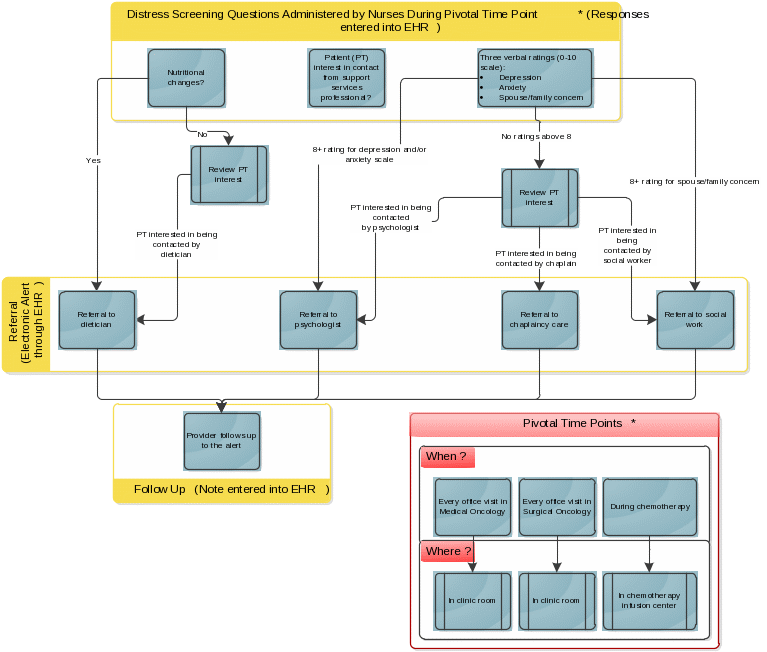Form 0920-19MM Focus Group Interview Guide
The Centers for Disease Control and Prevention (CDC) Study on Disparities in Distress Screening among Lung and Ovarian Cancer Survivors
Att 5e - Focus group interview guide visual aid & informed consent DS final
Focus Groups
OMB: 0920-1270
Attachment 5e: Focus group interview guide, visual aid and informed consent
Centers for Disease Control and Prevention
Disparities in Distress Screening among Ovarian and Lung Cancer Survivors Study
Focus Group Interview Guide
Form Approved
OMB Control # 0920-XXXX
Expiration Date: XX/XX/20XX
Collection
of this information is authorized by The Public Health Service Act,
Section 411 (42 USC 285a). Rights of study participants are
protected by The Privacy Act of 1974. Participation is voluntary,
and there are no penalties for not participating or withdrawing from
the study at any time. Refusal to participate will not affect your
benefits in any way. The information collected in this study will be
kept private to the extent provided by law. Names and other
identifiers will not appear in any report of the study. Information
provided will be combined for all study participants and reported as
summaries. You are being contacted to participate in this data
collection so that we can further understand how psychosocial
distress screening practices are implemented for lung and ovarian
cancer survivors. Public
reporting burden for this collection of information is estimated to
average 90 minutes per response, including the time for reviewing
instructions, searching existing data sources, gathering and
maintaining the data needed, and completing and reviewing the
collection of information. An agency may not conduct or sponsor, and
a person is not required to respond to, a collection of information
unless it displays a currently valid OMB control number. Send
comments regarding this burden estimate or any other aspect of this
collection of information, including suggestions for reducing this
burden to: CDC/ATSDR Information Collection Review Office, 1600
Clifton Road NE, MS D-74, Atlanta, Georgia 30329; ATTN: PRA
(0920-XXXX). Do not return the completed form to this address.
INTRODUCTION
Hello Everyone. Thank you all for taking the time to talk with us today. The purpose of this focus group is to develop a richer understanding of the distress screening procedures among ovarian and lung cancer patients at [NAME OF HEALTHCARE FACILITY/CANCER TREATMENT PROGRAM]. Today’s questions are all about your perceptions on and experiences with your healthcare facility’s policies and processes for distress screening, referral, follow-up etc. Please keep in mind that there are no right or wrong answers and we are NOT looking for any specific responses. These questions are only to help us get a glimpse into how things work at your healthcare facility.
CONFIDENTIALITY/INFORMED CONSENT
This session will last approximately 1.5 hours.
Everything we talk about will be kept secure to the extent permitted by law. We request that you do not reveal the identity of the people in this room or the details of the conversation to anyone outside of this group. With everyone’s permission, we would like to record the conversation. We use it solely as a backup to our notes and destroy it at the end of the study. It will not be shared beyond our internal team at Westat.
Your participation is completely voluntary, and you have the right to stop at any time or to refuse to answer any question.
Your responses to these questions will not be shared outside of the evaluation team. In our summary findings, your responses will be combined with other people’s responses, so your answers will never be attributed to your name. We may use quotes from you or other focus group participants in our reports, however, in such cases, they will not be linked to any names or identifiers.
We will go around the room and will ask everyone to verbally agree to participate in the focus group. [FIRST PERSON], do you agree to continue with the focus group?
[Address each individual in the room with the same question]
[OBTAIN INFORMED CONSENT]
We would like to record this interview so that we can be sure to accurately capture your responses. A recording would only be reviewed by a small number of Westat staff members. If you do not agree to have the interview recorded, we can still conduct the interview without turning on the recorder.
Would it be okay with you if we record this interview?
[OBTAIN CONSENT TO RECORD SESSION]
[IF CONSENT IS GIVEN TO RECORD, THEN SAY WHILE RECORDING]:
Okay, just for confirmation, you have agreed to participate in this interview and have agreed to allow us to record this session. You understand that your responses will be kept secure, you can refuse to answer any questions, and you can stop the interview at any time. Is that correct?
Interview questions
Overview of the Program/Facility/Service
Respondent level information [ASKED ONLY IF INFORMATION HAS NOT BEEN OBTAINED FROM PRIOR COMMUNICATIONS]
What is your title/role at [HEALTHCARE FACILITY OR FACILITY NAME]?
How long have you been doing this type of work or related work?
Processes for Distress Screening, Referral, and Follow-up
Screening
[FOR HEALTHCARE FACILITIES THAT PROVIDE A DISTRESS SCREENING PROTOCOL – STUDY STAFF WILL DEVELOP A ONE-PAGE VISUAL AID TO GUIDE THE DISCUSSION]. Does this diagram accurately describe the process you are familiar with for administering distress screening to patients at [HEALTHCARE FACILITY NAME]? We would like to know if there are instances in which this is different from your personal on-the-ground experiences.
[FOR HEALTHCARE FACILITIES THAT DO NOT PROVIDE DISTRESS SCREENING PROTOCOL] Please describe the process for administering distress screening to patients at [HEALTHCARE FACILITY NAME].
Probes:
What might be some differences in these procedures between ovarian and lung cancer survivors than it is for others?
Is the screening self-administered? If not, who administers the screening?
Where do the screenings typically take place (e.g. waiting rooms, chemotherapy session)?
In your work, is there a “pivotal medical visit” during which the distress screening might be administered? How is it typically defined? Is this similar for all patients?
Referral and Follow-up Care
What is the referral process for the psychosocial services when a patient screens positive for distress?
Probe:
What kind of services are patients most commonly referred to?
Procedural issues with Documentation/Medical Records
How is distress screening, assessment, referral and/or follow-up documented?
Probes:
Is distress screening documented in your EHR?
If so, what specific information is documented?
In what formats are they typically documented (e.g. scanned doc, specific field, general notes section, etc.)?
When are they documented?
Is the process any different for ovarian and lung cancer?
Is it easy to document information about distress screening?
Implementation
Do you think [HEALTHCARE FACILITY NAME] has the adequate (staff) capacity to provide distress screening, referral and follow-up?
What types of training (if any) do staff receive for administering the distress screening?
Overall, how are the distress screening procedures working for the patients? How is it working for the staff?
Do you have any recommendations for improving screening, referral and follow-up care for distressed patients?
Focus Group Visual Aid
Dear Focus Group Participant,
In preparation for your upcoming participation in the focus group for the CDC Disparities in Distress Screening among Ovarian and Lung Cancer Survivors Study, we have prepared a diagrammatic flow of the distress screening process at [HEALTHCARE FACILITY NAME]. We created this flowchart based on our understanding of information provided to us by staff at your facility. We will use this to initiate our discussion about your experiences with distress screening and follow-up practices at [HEALTHCARE FACILITY NAME], and the extent to which it reflects your understanding of the process.
Please take a quick look before the focus group discussion, scheduled on [DAY OF WEEK, MONTH AND DATE].
Best,
[NAME OF WESTAT INTERVIEWER]

*Adapted from example in “PSYCHOSOCIAL DISTRESS SCREENING: Lessons Learned from Three ACCC Member Programs” by the Association of Community Cancer Centers; URL: https://www.accc-cancer.org/docs/docs-imported/resources/pdf/distress-screening-white-paper
| File Type | application/vnd.openxmlformats-officedocument.wordprocessingml.document |
| Author | Grace Huang |
| File Modified | 0000-00-00 |
| File Created | 2021-01-15 |
© 2026 OMB.report | Privacy Policy